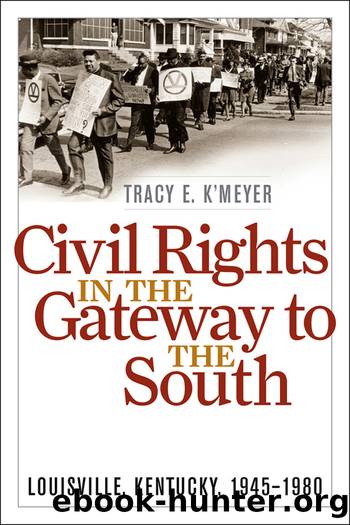Civil Rights in the Gateway to the South: Louisville, Kentucky, 1945-1980 by Tracy E. K'Meyer

Author:Tracy E. K'Meyer [K'Meyer, Tracy E.]
Language: eng
Format: epub
Tags: history, United States, 20th Century, State & Local, South (AL; AR; FL; GA; KY; LA; MS; NC; SC; TN; VA; WV), political science, Civil Rights
ISBN: 9780813173351
Google: zCOzq9xuXLMC
Publisher: University Press of Kentucky
Published: 2009-05-22T00:11:02.264522+00:00
7
Making Civil Rights Gains Real
In 1969 the Louisville Courier-Journal and Louisville Times enlisted Roper Research Associates to conduct an in-depth study of the living conditions and attitudes about race relations of white and black residents of Louisville. The resulting report documented the stark differences in whitesâ and blacksâ living conditions, the âdismalâ state of the latter, and the âfrighteningâ lack of awareness and concern of the white community about both. The divergence on particular points was striking. Close to half of African Americans reported a shortage of housing or problems with landlords, while only 3 percent of whites considered access to good housing a problem at all. When asked whether blacks had equal opportunity when applying for employment, 72 percent of blacks said no. But only 25 percent of whites agreed that those of their race would have a better chance at a job than an equally qualified African American. When asked if policemen disrespected or treated blacks unequally, 68 percent of blacks said yes, but only 30 percent of whites did so. More generally, the researchers found that African American residents felt alienated from and underserved by their local government. And, perhaps most troubling to a community that had long prided itself on its racial progress, white Louisvillians overwhelmingly believed blacks were better off in the city than elsewhere and that government was doing enough to guarantee equality, while blacks disagreed on both scores. The authorsâ stark conclusion was that in 1969, despite purported gains in civil rights over the last decade, in Louisville whites and blacks continued to live in two separate and unequal worlds.1
Most narratives of the fight for racial equality begin to wind down after 1968, describing movement forces dissipating or collapsing from internal differences, or tales of government repression forcing activists into quiescence. Yet the Roper studyâs findings and the persistence of racial tension around the country revealed that, as the new decade began, the work of the movement was far from over. Moreover, in the experience of civil rights activists, the freedom struggle stretched on into succeeding decades as they continued to fight to realize the equality that was promised in the legislation of the 1960s. The question in the 1970s for activists around the country was how to translate that promise into real social, economic, and political change. In Louisville, the answer was to combine the enforcement of existing laws by human relations agencies with persistent pressure by African Americans and their white allies working both inside and outside government. Although other issues arose, civil rights advocates focused on campaigns for African Americansâ rights to equal treatment by and within law enforcement, economic opportunity, and the just rewards of black political participation. The primacy of these issues, which call to mind places like Oakland, Philadelphia, and Gary, in a border city and self-proclaimed leader of the South, demonstrates the blurring of differences between racial problems and the action to overcome them in northern and southern urban areas by the later years of the civil rights era.
Download
This site does not store any files on its server. We only index and link to content provided by other sites. Please contact the content providers to delete copyright contents if any and email us, we'll remove relevant links or contents immediately.
| Africa | Americas |
| Arctic & Antarctica | Asia |
| Australia & Oceania | Europe |
| Middle East | Russia |
| United States | World |
| Ancient Civilizations | Military |
| Historical Study & Educational Resources |
Machine Learning at Scale with H2O by Gregory Keys | David Whiting(4290)
Never by Ken Follett(3931)
Fairy Tale by Stephen King(3366)
Oathbringer (The Stormlight Archive, Book 3) by Brandon Sanderson(3130)
The Man Who Died Twice by Richard Osman(3065)
Will by Will Smith(2904)
Rationality by Steven Pinker(2349)
Can't Hurt Me: Master Your Mind and Defy the Odds - Clean Edition by David Goggins(2319)
The Dark Hours by Michael Connelly(2299)
Friends, Lovers, and the Big Terrible Thing by Matthew Perry(2211)
The Dawn of Everything: A New History of Humanity by David Graeber & David Wengrow(2186)
Principles for Dealing With the Changing World Order: Why Nations Succeed and Fail by Ray Dalio(2033)
A Short History of War by Jeremy Black(1837)
HBR's 10 Must Reads 2022 by Harvard Business Review(1832)
Go Tell the Bees That I Am Gone by Diana Gabaldon(1746)
A Game of Thrones (The Illustrated Edition) by George R. R. Martin(1707)
Kingdom of Ash by Maas Sarah J(1661)
515945210 by Unknown(1660)
443319537 by Unknown(1542)
